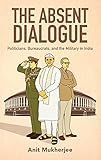The Absent Dialogue : politicians, bureaucrats, and the military in India / Anit Mukherjee.
Material type: TextSeries: Modern South AsiaPublication details: New York: Oxford University Press, 2020.Description: xvii, 313 pages ; 24 cmISBN:
TextSeries: Modern South AsiaPublication details: New York: Oxford University Press, 2020.Description: xvii, 313 pages ; 24 cmISBN: - 9780190905903 (hbk)
- 322/.50954 23
- JQ220 .C58 M953 2020
| Item type | Current library | Collection | Call number | Copy number | Status | Barcode | |
|---|---|---|---|---|---|---|---|
 Books
Books
|
Rabdan Academy General Stacks | General Collection | JQ220 .C58 M953 2020 (Browse shelf(Opens below)) | C. 1 | Available | 23284 |
Includes bibliographical references and index.
"Civilian control over the military is widely hailed as among the biggest successes of India's democracy. This is a rarity, especially among post-colonial states, and is rightfully celebrated. But has this come at a cost? In The Absent Dialogue, Anit Mukherjee argues that the pattern of civil-military relations in India has hampered its military effectiveness. Indian politicians and bureaucrats have long been content with the formal and ritualistic exercise of civilian control, while the military continues to operate in institutional silos, with little substantive engagement between the two. In making this claim, the book closely examines the variables most closely associated with military effectiveness -- weapons procurement, jointness (the ability of separate military services to operate together), officer education, promotion policies, and defense planning. India's pattern of civil-military relations -- best characterized as an absent dialogue -- adversely affects each of these processes. Theoretically, the book adopts the 'unequal dialogue' framework proposed by Eliot Cohen but also argues that, under some conditions, patterns of civil-military relations maybe more closely resemble an 'absent dialogue.' Informed by more than a hundred and fifty interviews and recently available archival material, the book represents a deep dive into understanding the power and the limitations of the Indian military. It sheds new light on India's military history and is essential reading for understanding contemporary civil-military relations and recurring problems therein. While the book focuses on India, it also highlights the importance of civilian expertise and institutional design in enhancing civilian control and military effectiveness in other democracies"--
There are no comments on this title.
